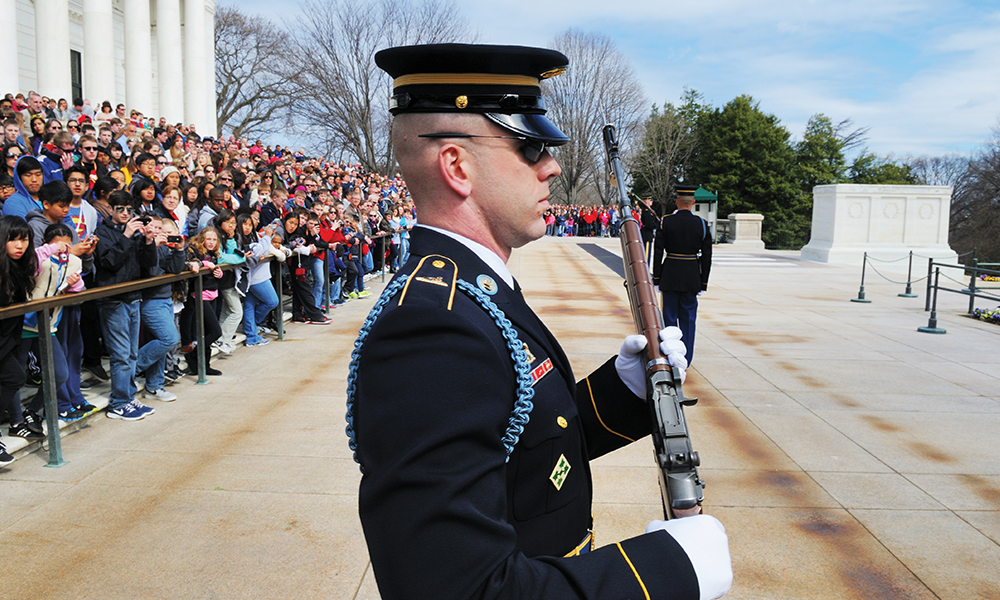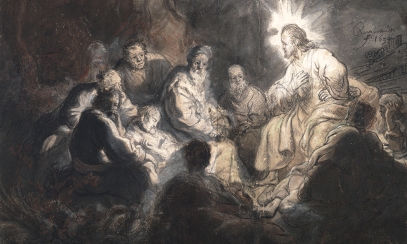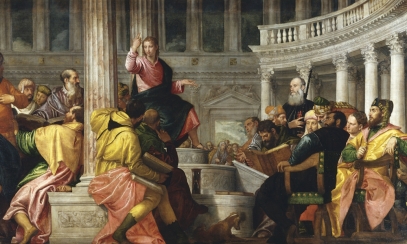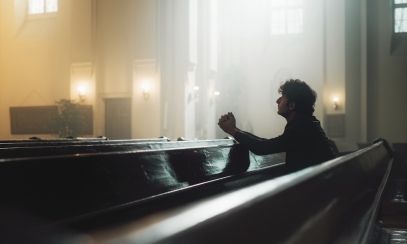
Present to a sacrifice
During my time studying in Washington, D.C., one of my favorite places to visit was Arlington National Cemetery. It is a peaceful place to go just outside the hustle and bustle of the capital. I am particularly moved when witnessing the powerful ritual of the changing of the guard at the Tomb of the Unknown Soldier. The tomb is watched over 24/7 regardless of the weather.
During my time studying in Washington, D.C., one of my favorite places to visit was Arlington National Cemetery. It is a peaceful place to go just outside the hustle and bustle of the capital. I am particularly moved when witnessing the powerful ritual of the changing of the guard at the Tomb of the Unknown Soldier. The tomb is watched over 24/7 regardless of the weather.
During the ritual, we hear, “in keeping with the dignity of this ceremony, it is requested that everyone remain silent and standing.” And people do remain silent and standing, whether there for the first time or the hundredth. They are drawn in by the ceremony. As a matter of fact, if each guard chose to do their own thing, I do not think they would be so moved. There is beauty to the ritual. There is intense training involved by those who stand guard. There is perseverance in the ritual no matter the conditions, no matter what is going on outside of them— or inside of them, for that matter. Why? To honor a sacrifice.
Imagine if in that moment, the sacrifices of those fallen soldiers were made present to you. Imagine if you were able to witness their heroism in real time. What would that do in you?
We have been breaking open different parts of the Mass as we continue through the Eucharistic Revival. The Mass is not a reenactment of the Last Supper; it is an event.
The Catechism says, “The Eucharist is this sacrifice because it represents (makes present) the sacrifice of the cross, because it is its memorial and because it applies its fruit” (CCC 1366). The Eucharist makes present (re-presents) the sacrifice of the Cross. Through the Eucharistic Prayer, we are transported to Calvary and the empty tomb. Have you ever thought about that? The sacrifice is made present for us as Jesus says through the priest, “This is my body which will be given up for you.”
When we witness the changing of the guard at the Tomb of the Unknown Soldier, certain desires are awakened in us. As we honor their sacrifice, we are pulled out of our consumerist and pragmatic concerns and realize, if only for a moment, “I want to live this way.” The sacrifice stirs in us a desire for a beautiful life.
As we are present to the sacrifice of the Mass, the same happens. But it is not only a desire that is awakened, but the fruits needed for that desire to be realized are given. As we are present to the Eucharist, the desire to live the words, “This is my body given for you” becomes present in us.
We give our bodies in so many different ways. Being faithful to prayer and Sunday Mass when the desires of the flesh and the concerns of the world pull us elsewhere, caring for a sick family member, enduring one’s own illness with patience and grace, being up with a child, running your teenage kids to this or that event, all of these are various ways in which “This is my body given for you” becomes concrete for us.
Pope Francis in his recent letter, Desiderio Desideravi, said in regard to the liturgy, “Beauty, just like truth, always engenders wonder, and when these are referred to the mystery of God they lead to adoration.” He said, “If there were lacking our astonishment at the fact that the paschal mystery is rendered present in the concreteness of sacramental signs, we would truly risk being impermeable to the ocean of grace that floods every celebration.”
My friends, let’s pray that the Holy Spirit would heal our disenchantment so that we could truly see what is happening at every Mass. Let’s pray for the grace to be astonished and full of wonder, and in the process have hearts that are wide open to the ocean of grace flooding every Mass.
Father Andy Laframboise is pastor of St. Elizabeth of Hungary Parish in Reese and St. Frances Xavier Cabrini Parish in Vassar and director of priestly vocations. He holds a licentiate in Sacred Theology in Marriage and Family Studies from the Pontifical John Paul II Institute for Studies on Marriage and Family.



